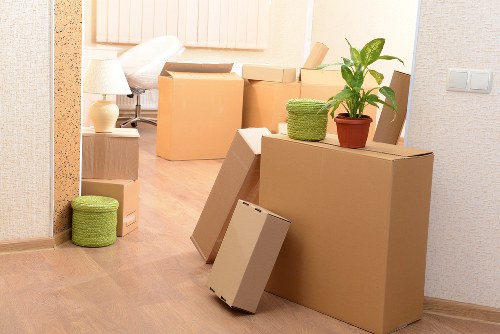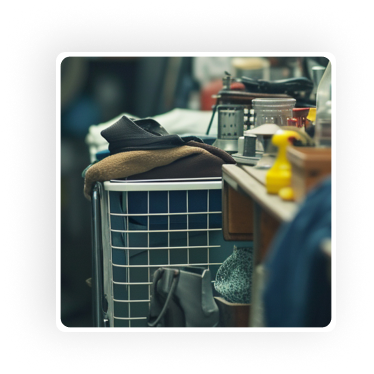Comprehensive Guide to Large Item Collection in Reading
Managing large items such as furniture, appliances, and bulky waste can be a daunting task. Whether you're moving homes, cleaning out your garage, or simply decluttering, understanding the process of large item collection in Reading is essential. This guide aims to provide you with all the necessary information to make your large item collection seamless and stress-free.
Efficient large item collection not only helps in maintaining a clutter-free environment but also contributes to sustainable waste management. By choosing the right services and following best practices, you can ensure that your large items are disposed of responsibly.
In this article, we'll explore what constitutes a large item, the benefits of proper collection, the process involved, and the services available in Reading and its nearby areas. Additionally, we'll offer tips and address common challenges to help you navigate large item collection with ease.

Understanding Large Item Collection
Large item collection involves the removal of bulky items that cannot be disposed of through regular waste collection services. These items often require special handling due to their size, weight, or materials.
Proper management of large items is crucial for environmental sustainability. Many of these items can be recycled or repurposed, reducing the strain on landfills and conserving valuable resources.
By understanding the scope and benefits of large item collection, you can make informed decisions that align with both your personal needs and broader environmental goals.
What Constitutes a Large Item?
A large item typically refers to any object that exceeds the size and weight limits of standard waste collection services. Common examples include:
- Furniture such as sofas, beds, and tables
- Appliances like refrigerators, washing machines, and dryers
- Mattresses and box springs
- Large electronics, including TVs and home theater systems
- Bulky waste from construction or renovation projects
Benefits of Efficient Large Item Collection
Efficient large item collection offers numerous benefits, including:
- Environmental Protection: Proper disposal and recycling reduce environmental impact.
- Space Management: Frees up valuable space in your home or business premises.
- Health and Safety: Eliminates potential hazards associated with old or broken large items.
- Convenience: Saves time and effort compared to self-removal.

The Process of Large Item Collection
Understanding the process involved in large item collection can help streamline the experience. Here's a step-by-step overview:
Scheduling a Pickup
The first step is to schedule a pickup with a reputable large item collection service. This can often be done online or over the phone. Providing accurate information about the items and availability ensures a smooth scheduling process.
It's advisable to book in advance, especially during peak seasons, to secure a convenient time slot. Some services may offer same-day or next-day pickups based on availability.
Preparing Items for Collection
Before the scheduled pickup, proper preparation of your items is essential. This includes:
- Disassembling furniture if possible
- Removing any hazardous materials or contents
- Ensuring pathways are clear for easy access
- Securing loose parts to prevent damage during transit
Taking these steps can facilitate a quicker and more efficient collection process.

Services Offered in Reading
Reading offers a variety of large item collection services tailored to meet diverse needs. Whether you're disposing of a single item or managing multiple bulky objects, there's a service to cater to your requirements.
Recycling and Disposal Options
Many large item collection services prioritize recycling and responsible disposal. Items such as electronics, furniture, and appliances are often processed for reuse or material recovery, minimizing environmental impact.
Additionally, some services collaborate with local charities and organizations to facilitate the donation of usable items, promoting community support and sustainability.
Cost Considerations
The cost of large item collection can vary based on several factors, including:
- The number and size of items
- Location and accessibility
- Type of service (standard or expedited)
- Recycling or donation requirements
It's recommended to obtain quotes from multiple providers to compare prices and services, ensuring you receive the best value for your needs.

Local Relevance and Nearby Areas
Reading is surrounded by several areas that also benefit from large item collection services. Understanding the proximity and unique features of these locations can help you identify the best options for your collection needs.
Areas Closest to Reading for Large Item Collection
- Earley: Located just a few miles from Reading, Earley offers prompt collection services with flexible scheduling options.
- Kennedy: Kenneth is known for its eco-friendly disposal methods, ensuring that large items are recycled appropriately.
- Tilehurst: Tilehurst provides comprehensive services, including same-day pickups for urgent needs.
- Redhill: Redhill specializes in the collection and resale of gently used large items, promoting sustainability.
- Emmer Green: Emmer Green offers affordable collection rates, making it a popular choice among residents.
- Thatcham: Thatcham focuses on responsible disposal, partnering with local charities to donate usable items.
- Wokingham: Wokingham provides reliable services with a reputation for efficiency and customer satisfaction.
- Highmoor: Highmoor's collection services are known for their attention to detail and careful handling of items.
- Fantastic: Fantastic offers a range of services, including commercial large item collection for businesses.
- Goring: Goring provides personalized services, catering to specific customer needs and preferences.
- Pangbourne: Pangbourne focuses on sustainable practices, ensuring minimal environmental impact.
- Sonning: Sonning offers competitive pricing and flexible scheduling to accommodate various requirements.
- Henley-on-Thames: Henley-on-Thames emphasizes community support, often collaborating with local organizations for donations.
- Binfield: Binfield is known for its prompt and professional collection services, ensuring customer satisfaction.
- Norcot: Norcot provides comprehensive disposal solutions, including hazardous waste management for large items.

Tips for Efficient Large Item Collection
To ensure a smooth and efficient large item collection experience, consider the following tips:
- Plan Ahead: Schedule your collection in advance to secure a convenient time slot.
- Accurate Information: Provide detailed information about the items to be collected to avoid delays.
- Proper Packaging: Securely package or disassemble items to prevent damage during transit.
- Clear Access: Ensure that pathways and access points are free from obstructions for easy collection.
- Sort Items: Separate items for recycling, donation, or disposal to facilitate the collection process.
- Communicate Special Requirements: Inform the service provider of any specific handling instructions or requirements.
- Stay Available: Be present during the scheduled pickup to oversee the process and address any issues.
Common Challenges and Solutions
While large item collection can be straightforward, certain challenges may arise. Being aware of these potential issues and their solutions can help mitigate any inconveniences.
- Limited Access: Narrow driveways or heavy traffic can impede collection. Solution: Communicate access restrictions in advance and follow provided guidelines.
- Item Accessibility: Items stored in attics or basements may be difficult to retrieve. Solution: Assist the collection team by lifting or moving items to accessible locations.
- Payment Discrepancies: Unexpected costs can cause frustration. Solution: Obtain a clear pricing structure beforehand and confirm all charges.
- Environmental Concerns: Improper disposal can harm the environment. Solution: Choose services that prioritize recycling and responsible disposal practices.
The Future of Large Item Collection
The landscape of large item collection is evolving with advancements in technology and growing environmental awareness. Future trends may include:
- Automated Scheduling: Enhanced online platforms for easier and more efficient booking processes.
- Smart Logistics: Utilizing data analytics to optimize collection routes and reduce carbon footprints.
- Increased Recycling Efforts: Greater emphasis on recycling and repurposing materials from large items.
- Enhanced Customer Experience: Improved communication and service personalization to meet diverse customer needs.
Staying informed about these trends can help both service providers and customers adapt to the changing demands of large item collection.
Frequently Asked Questions
1. What items are considered large for collection?
Large items typically include furniture like sofas and beds, appliances such as refrigerators and washing machines, mattresses, large electronics, and bulky construction waste. If you're unsure, it's best to contact your local collection service for clarification.
2. How do I schedule a large item pickup in Reading?
Scheduling a pickup is straightforward. You can contact local collection services via phone or their online platforms. Provide details about the items, your location, and preferred pickup times to arrange the service.
3. Are there any costs associated with large item collection?
Yes, costs can vary based on the number and size of items, location, and specific service requirements. It's recommended to request quotes from multiple providers to compare prices and find the best fit for your needs.
4. What should I do before the large items are collected?
Before collection, ensure that items are accessible, disassembled if necessary, and free from any hazardous materials. Clear pathways to the collection point and communicate any special instructions to the service provider.
5. Can large items be recycled or donated?
Many large items can be recycled or donated, depending on their condition. Electronics and appliances are often recyclable, while gently used furniture and other items can be donated to local charities or organizations. Check with your collection service for specific recycling and donation options.

